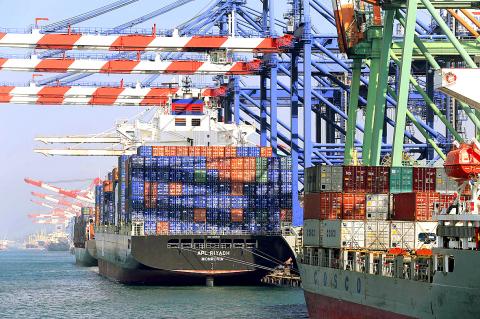The value of export orders dropped 5.9 percent annually and 4.1 percent monthly to US$35.79 billion last month, dragged down mainly by declining orders from China and Hong Kong, the Ministry of Economic Affairs said yesterday.
The value of orders from China and Hong Kong fell by US$1.17 billion from a year earlier to US$8.98 billion last month, accounting for 52.7 percent of the US$2.22 billion annual drop in overall export orders last month, the ministry said.
“The increasing localization of supply chains in China is an issue that we have to face seriously,” Department of Statistics Director-General Lin Lee-jen (林麗貞) told a news conference in Taipei, adding that last month’s data on orders from China and Hong Kong marked the fifth consecutive month of decline, excluding Lunar New Year holiday factors.

Photo: CNA
Weaker-than-expected growth in China has also affected demand for Taiwanese goods, Lin said. She said it would be worth observing if the annual decline in export orders from China and Hong Kong would extend throughout the year, citing the faster-than-expected rise of supply chains in China.
“Aside from flat panels, we noticed that Taiwan’s integrated circuit design, packaging and testing service sectors have also been facing increasing challenges in China,” Lin said.
In addition, the weak demand for PCs in Europe and handheld devices in emerging markets also affected the performance of the nation’s electronics and precision instruments industries, Lin said.
Apart from the information and communication technology industry, which saw a 2.3 percent annual increase in orders to US$9.7 billion, the ministry’s report showed broad declines in orders for electronics, precision instruments, basic metals, petrochemicals and machinery products last month from the same period a year ago.
By country, the US was still Taiwan’s largest export destination, with orders increasing 5.2 percent to US$9.79 billion from the same period a year ago, Lin said.
However, the annual growth rate for US orders was slower than the 14 percent registered a month earlier, an indicator of weakening demand as the product cycle for Apple Inc’s iPhone nears a refresh, Lin said.
Orders from China and Hong Kong, Europe, ASEAN and Japan all saw an annual decline last month, with orders from China and Hong Kong and Japan plunging by double-digit percentage points from a year ago, Lin said.
Lin said the ministry forecasts the value of this month’s export orders to be flat or decline from last month’s US$35.79 billion. As such, the value of export orders this month will likely decline from last year’s US$38.82 billion, she said.
The value of export orders totaled US$180.47 billion in the first five months of this year, 0.6 percent less than in the same period last year, the ministry’s data showed.
The total value for the first half of this year is expected to be less than the US$220.47 billion in the same period last year, Lin said.
However, Lin said the ministry remains optimistic on export orders in the second half of this year, citing the upcoming launches of Microsoft Corp’s Windows 10 operating system and new Apple products.

ENDEAVOR MANTA: The ship is programmed to automatically return to its designated home port and would self-destruct if seized by another party The Endeavor Manta, Taiwan’s first military-specification uncrewed surface vehicle (USV) tailor-made to operate in the Taiwan Strait in a bid to bolster the nation’s asymmetric combat capabilities made its first appearance at Kaohsiung’s Singda Harbor yesterday. Taking inspiration from Ukraine’s navy, which is using USVs to force Russia’s Black Sea fleet to take shelter within its own ports, CSBC Taiwan (台灣國際造船) established a research and development unit on USVs last year, CSBC chairman Huang Cheng-hung (黃正弘) said. With the exception of the satellite guidance system and the outboard motors — which were purchased from foreign companies that were not affiliated with Chinese-funded

PERMIT REVOKED: The influencer at a news conference said the National Immigration Agency was infringing on human rights and persecuting Chinese spouses Chinese influencer “Yaya in Taiwan” (亞亞在台灣) yesterday evening voluntarily left Taiwan, despite saying yesterday morning that she had “no intention” of leaving after her residence permit was revoked over her comments on Taiwan being “unified” with China by military force. The Ministry of the Interior yesterday had said that it could forcibly deport the influencer at midnight, but was considering taking a more flexible approach and beginning procedures this morning. The influencer, whose given name is Liu Zhenya (劉振亞), departed on a 8:45pm flight from Taipei International Airport (Songshan airport) to Fuzhou, China. Liu held a news conference at the airport at 7pm,

Taiwan was ranked the fourth-safest country in the world with a score of 82.9, trailing only Andorra, the United Arab Emirates and Qatar in Numbeo’s Safety Index by Country report. Taiwan’s score improved by 0.1 points compared with last year’s mid-year report, which had Taiwan fourth with a score of 82.8. However, both scores were lower than in last year’s first review, when Taiwan scored 83.3, and are a long way from when Taiwan was named the second-safest country in the world in 2021, scoring 84.8. Taiwan ranked higher than Singapore in ninth with a score of 77.4 and Japan in 10th with

GRIDLOCK: The National Fire Agency’s Special Search and Rescue team is on standby to travel to the countries to help out with the rescue effort A powerful earthquake rocked Myanmar and neighboring Thailand yesterday, killing at least three people in Bangkok and burying dozens when a high-rise building under construction collapsed. Footage shared on social media from Myanmar’s second-largest city showed widespread destruction, raising fears that many were trapped under the rubble or killed. The magnitude 7.7 earthquake, with an epicenter near Mandalay in Myanmar, struck at midday and was followed by a strong magnitude 6.4 aftershock. The extent of death, injury and destruction — especially in Myanmar, which is embroiled in a civil war and where information is tightly controlled at the best of times —